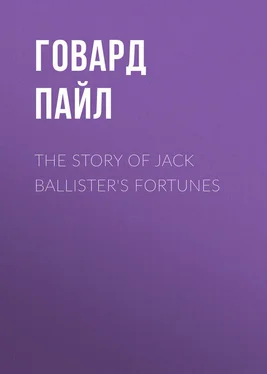Говард Пайл - The Story of Jack Ballister's Fortunes
Здесь есть возможность читать онлайн «Говард Пайл - The Story of Jack Ballister's Fortunes» — ознакомительный отрывок электронной книги совершенно бесплатно, а после прочтения отрывка купить полную версию. В некоторых случаях можно слушать аудио, скачать через торрент в формате fb2 и присутствует краткое содержание. Издательство: Иностранный паблик, Жанр: foreign_antique, foreign_prose, на английском языке. Описание произведения, (предисловие) а так же отзывы посетителей доступны на портале библиотеки ЛибКат.
- Название:The Story of Jack Ballister's Fortunes
- Автор:
- Издательство:Иностранный паблик
- Жанр:
- Год:неизвестен
- ISBN:нет данных
- Рейтинг книги:5 / 5. Голосов: 1
-
Избранное:Добавить в избранное
- Отзывы:
-
Ваша оценка:
- 100
- 1
- 2
- 3
- 4
- 5
The Story of Jack Ballister's Fortunes: краткое содержание, описание и аннотация
Предлагаем к чтению аннотацию, описание, краткое содержание или предисловие (зависит от того, что написал сам автор книги «The Story of Jack Ballister's Fortunes»). Если вы не нашли необходимую информацию о книге — напишите в комментариях, мы постараемся отыскать её.
The Story of Jack Ballister's Fortunes — читать онлайн ознакомительный отрывок
Ниже представлен текст книги, разбитый по страницам. Система сохранения места последней прочитанной страницы, позволяет с удобством читать онлайн бесплатно книгу «The Story of Jack Ballister's Fortunes», без необходимости каждый раз заново искать на чём Вы остановились. Поставьте закладку, и сможете в любой момент перейти на страницу, на которой закончили чтение.
Интервал:
Закладка:
Howard Pyle
The Story of Jack Ballister's Fortunes
INTRODUCTION
ONE of the most important problems that confronted the Virginia plantations in the earlier colonial days was the question as to how to obtain sufficient labor to till the soil and to raise tobacco for the English market.
Some of the colonial planters of Virginia owned thousands of acres of the richest tobacco land in the world – whole tracts of virgin earth where the priceless loam lay open to the rain, the air, and the warm sky; bountifully fruitful loam, only waiting for tillage to be coined into vast tobacco fortunes for the princely owners. All that was needed was human labor to dig the earth, to plant, to hoe, to cultivate, and to prepare the tobacco for market, for there was not a hundredth part enough labor to turn the waiting soil, that lay ready to yield at any time its thousands of hogsheads of tobacco, and the question was, where and how labor was to be obtained.
The easiest and quickest solution of the question appeared to be the importation of negro slave labor from Africa.
The introduction of such slave labor began almost in the earliest days of the provinces. Hundreds of shiploads of African negroes were brought across the ocean and set to work digging and hoeing in the tobacco fields, and slave trade became a regular traffic between the west coast of Africa and the Americas.
But the African slaves, when imported, were found only fit to do the very rudest and simplest sort of labor. They were poor, ignorant savages, who, until they were set to work on the plantations, knew almost nothing at all about such labor as was practised by civilized mankind. When they were told to dig the earth, they dug, but they labored without knowing either why they worked or wherefore. They did just as their masters or their overseers bade them, and nothing more. Beyond this they could be taught little or nothing, for not only were those earlier savages like children, incapable of learning much of anything; but, in most instances, they could not even speak a single word of the language of their masters, and so could not understand what their owners wanted of them. They were of use only to work as a dumb animal might work, and not as white men could work.
So the Virginia plantations were still without that intelligent labor which white men alone could bring to the tilling of the soil; labor that knew what it was about when it dug the earth, and which, when told to do so, could turn its hand to other things that might be required of it. And so it was that every means was used to bring English men and women to the Virginia plantations.
Even in the last part of the seventeenth century those immigrants who afterward developed our great country into what it now is, were beginning to pour into the colonies. But, of this immigrant labor, the best and the most intelligent did not come to Virginia or other of the southern provinces. It drifted to the New England or the Pennsylvania provinces rather than to those in the South. There, in the North, any man could obtain a farm for himself by hewing it out of the wilderness. In Virginia the land was nearly all owned by the great tobacco planters. Hence it was that only the poorest and least ambitious of these white men and women could in the earlier provincial days be induced to go thither, and hence white labor was so much more in demand in the South than in the North.
A certain class of the immigrants of that time were called “redemptioners” or “redemption servants.” They were so called because they had to redeem by their labor the cost of their passage across the ocean from England to America. Upon their arrival in the New World they were sold for a term of years – seven, eight, nine, ten, as the case might be – and the money received from such sale was paid to the ship captain or the merchant who transported them from the Old World to the New. Thus their debt was redeemed, and hence their name.
Those who came thus as redemption servants from England were generally the poorest and most wretched of its people – paupers, outcasts, criminals – unfortunates who were willing to do almost anything to get away from their surroundings into a new life, where they hoped something better might be in store for them than that wretchedness which they had had to endure at home.
Thousands of such people were sent across the ocean to the Virginia and other plantations, where, poor and miserable as they often were, the demand for them grew ever greater and greater as the wilderness became more and more open to cultivation.
Every year higher and higher prices were paid for such servants, until, at last, a ship-load of redemptioners (provided the voyage across the ocean had been speedy and no contagious disease had developed aboard the vessel) became almost the most profitable cargo exported from England.
When the transportation of servants became thus so remunerative, the crimps who supplied them to merchants or to ship captains were oftentimes tempted, when other means failed, to resort to kidnapping, or man-stealing, to supply the demand.
During the earlier fifty years of the last century, thousands of men, women, and even children were stolen from England and sent away to the Americas, perhaps never to return, perhaps never even to be heard of again. In those days – “The kidnapper will catch you!” were words of terror to frighten children and gadding girls on all the coastways of England.
CHAPTER I
THE AMERICA MERCHANT
HEZEKIAH TIPTON had been a merchant in the America trade for upwards of forty years. He had shipped hundreds of servants to the Americas; they were as much a part of his cargo as tea or broad-cloth or books or silk stuffs.
Maybe he was not always scrupulously careful to know whence came some of the servants he thus transported. He was reasonably honest in his dealings, as the times went, and he would not often buy a servant from a crimp if he knew positively that the crimp had kidnapped the man. But if he was not positively sure, he would not go out of his way to inquire into things that did not concern him. He would either take the servant offered for sale, or else he would not take him; but he would not trouble himself to ask how the crimp obtained the man, or whether the man himself was or was not really willing to emigrate to the colonies.
There was, for instance, a good deal of talk at one time about three men whom Hezekiah had sent to South Carolina. A Dutchman had brought them into the harbor in his lugger. He said that the men desired to emigrate, and Hezekiah, who at that time had a ship just clearing for Charleston, expressed his willingness to pay the captain something for them, if he did not demand too much. Two of the men were stupefied with drink, and the third had a bloody clout wrapped around his head, and was cut and bruised as though he had been beaten with a club or a belaying-pin. It was an evident case of kidnapping, but nevertheless Hezekiah paid the Dutch captain for the men, and had them sent directly aboard the ship. One of the three men was sober the next morning. Hezekiah had come aboard the ship, and as he was rowed away toward the shore the man leaned over the rail above, shouting out curses after the old merchant, swearing that he would certainly come back to England some time and murder him. “You think you’re safe,” bawled the man after the departing boat, – “you think you’re safe! Wait till you feel my knife in your back this day twelve-month – d’ye hear? – then you won’t feel so safe.” The men rowing the boat to the shore grinned and winked at one another. Old Hezekiah sat immovably in the stern, paying no attention to the man’s threats and imprecations, which continued until the captain of the ship knocked him down, and so silenced his outcries.
Читать дальшеИнтервал:
Закладка:
Похожие книги на «The Story of Jack Ballister's Fortunes»
Представляем Вашему вниманию похожие книги на «The Story of Jack Ballister's Fortunes» списком для выбора. Мы отобрали схожую по названию и смыслу литературу в надежде предоставить читателям больше вариантов отыскать новые, интересные, ещё непрочитанные произведения.
Обсуждение, отзывы о книге «The Story of Jack Ballister's Fortunes» и просто собственные мнения читателей. Оставьте ваши комментарии, напишите, что Вы думаете о произведении, его смысле или главных героях. Укажите что конкретно понравилось, а что нет, и почему Вы так считаете.












